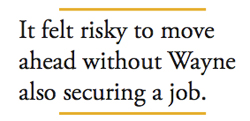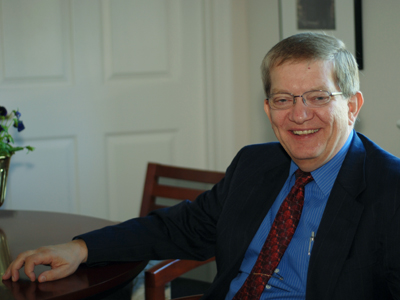Anabaptist Learning Institute (ALI), a program of Mennonite Schools Council (MSC) and Mennonite Education Agency (MEA), is offering two courses this June. “Shaping a Community of Learners” will be held June 14-18, in Lancaster, Pa., and “Understanding the Roots of Community” will be held June 21-26, in Lansdale, Pa. These ALI courses are not only for faculty and administrators, but also for pastors, youth pastors, Christian education directors, Mennonite agency employees and public school teachers.
Students have appreciated the opportunity to learn more about the Anabaptist/Mennonite perspective. “I learned so much about where Mennonites have come from and was able to make a connection with the foundation upon which the Mennonite faith is based,” said one student.
“Shaping a Community of Learners,” will be taught by Dr. Donovan Steiner, Ph.D., director of Master of Arts in education program at Eastern Mennonite University (EMU), with assistance from Myron Blosser, M.A., science instructor at Eastern Mennonite School. Students will be asked to reflect on their spiritual journey, to craft a personal mission statement for teaching, and to integrate faith seamlessly into their instruction. Faith development for children and youth will inform teaching practice that is content and grade specific. Pedagogical methods will be introduced and /or reviewed for their congruence with Anabaptist/Mennonite faith and practice.
Students enrolled in “Shaping a Community of Learners” can earn three graduate semester hours from EMU. Act 48 Credit is available for Pennsylvania teachers granted a letter grade. Audit credit is not honored by the Pennsylvania Department of Education.
“Understanding the Roots of Community” will be taught by Alan Kreider, Ph.D., retired professor of church history and mission at Associated Mennonite Biblical Seminary (AMBS). Students will explore the theology and history of the Anabaptist movement while being encouraged to articulate the significance of this movement for themselves as persons and as teachers. Class sessions will include lectures by Dr. Kreider, discussions on the assigned readings from Anabaptist texts and current historians, and occasional dramatic readings of historical documents.
Participants enrolled in the course “Understanding the Roots of Community” can earn three graduate semester hours from AMBS. Act 48 Credit may not be available through AMBS.
Registration for one or both of the summer ALI courses is available now online. In addition to the registration fee of $600; those who attend the course are responsible for textbooks, course materials, and their own lodging. Call 574-642-3164, extension 15, if you have questions.
ALI is designed to provide an intentional Christ-centered orientation and professional education program for teachers, pastors and other leaders. ALI also provides teachers and other interested persons with opportunities to earn graduate credit from AMBS, Bluffton (Ohio) University or EMU (determined by who is teaching the course). Those who complete all four of the graduate level courses (10 semester hours) earn the MEA seal as an Anabaptist Educator. The other two ALI courses are “Learning the Language of Community” (1sh) and “Building Caring Communities” (3sh).

 As a child, I loved to play church with my sister. We sang songs of faith, read scripture and I “preached.” It was not in the realm of my thinking or imagination at this early age that one day God would call me to be a pastor. My parents were people of deep faith in Jesus and served many years in either a congregational setting or in a Mennonite institution. Their love for Jesus and the Mennonite church inspired me to consider how I might serve the church.I was a shy child and slowly developed confidence and leadership gifts during my college and young adult years. I graduated from Hesston and Goshen colleges, served a year in voluntary service and gained work experience as an elementary school teacher and support staff at Goshen College before taking several classes at
As a child, I loved to play church with my sister. We sang songs of faith, read scripture and I “preached.” It was not in the realm of my thinking or imagination at this early age that one day God would call me to be a pastor. My parents were people of deep faith in Jesus and served many years in either a congregational setting or in a Mennonite institution. Their love for Jesus and the Mennonite church inspired me to consider how I might serve the church.I was a shy child and slowly developed confidence and leadership gifts during my college and young adult years. I graduated from Hesston and Goshen colleges, served a year in voluntary service and gained work experience as an elementary school teacher and support staff at Goshen College before taking several classes at  After my interview, I felt cautiously optimistic, but the doubts and questions persisted. My family’s previous transitions were focused on Wayne’s call, not mine. It felt risky to move ahead without Wayne also securing a job. The invitation came for me to be a candidate. Wayne and I needed a sign to be sure of God’s direction. The following day, in a meeting, the devotional was about Abraham’s call to go, leave his security and follow God to a new land.Several mornings later I awoke earlier than normal with Proverbs 3:5-6 on my mind, “Trust in the Lord with all your heart and lean not unto your own understanding. In all your ways acknowledge him and he will direct your paths.”With these signs from our God, who works in surprising and mysterious ways inviting us to risk, I accepted the pastoral position at Blooming Glen and have confidence that God will continue to provide what is needed.photo by Kreg Ulery
After my interview, I felt cautiously optimistic, but the doubts and questions persisted. My family’s previous transitions were focused on Wayne’s call, not mine. It felt risky to move ahead without Wayne also securing a job. The invitation came for me to be a candidate. Wayne and I needed a sign to be sure of God’s direction. The following day, in a meeting, the devotional was about Abraham’s call to go, leave his security and follow God to a new land.Several mornings later I awoke earlier than normal with Proverbs 3:5-6 on my mind, “Trust in the Lord with all your heart and lean not unto your own understanding. In all your ways acknowledge him and he will direct your paths.”With these signs from our God, who works in surprising and mysterious ways inviting us to risk, I accepted the pastoral position at Blooming Glen and have confidence that God will continue to provide what is needed.photo by Kreg Ulery  In my late 20’s our pastor at Kalona Mennonite Church, Howard Keim, invited me to participle in a leadership apprentice relationship with him. Over several years, I would meet with him periodically to talk about books on ministry and leadership that we were reading. During this time, he invited me to participate in a wide range of congregational leadership experiences, such as writing Bible study guides, leading small groups, and teaching the youth baptism class. After some time he asked me if I would consider preaching on a Sunday morning.
In my late 20’s our pastor at Kalona Mennonite Church, Howard Keim, invited me to participle in a leadership apprentice relationship with him. Over several years, I would meet with him periodically to talk about books on ministry and leadership that we were reading. During this time, he invited me to participate in a wide range of congregational leadership experiences, such as writing Bible study guides, leading small groups, and teaching the youth baptism class. After some time he asked me if I would consider preaching on a Sunday morning.